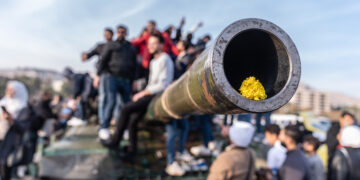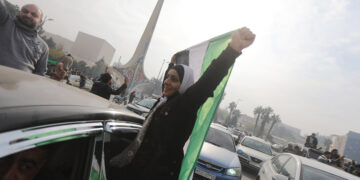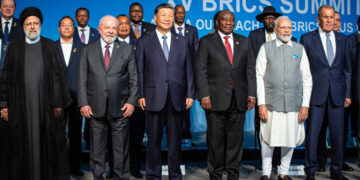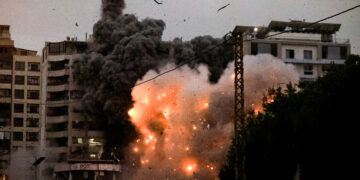Sarah Leah Whitson is the Executive Director of DAWN.
Published in the Washington Post, January 26, 2022
Shuaib Almosawa is a freelance journalist based in Sana'a, Yemen. Sarah Leah Whitson is executive director of Democracy for the Arab World Now.
Almost seven years since the Saudi-United Arab Emirates coalition launched its war in Yemen, the devastating impact of its relentless airstrikes and siege of the country's land, air and sea borders has reduced the country to shambles. The Biden administration promised to withdraw support for the war and push for a peace agreement, but its policies have further inflamed the fighting, which now has seriously expanded well beyond Yemen's borders, from deep inside Saudi Arabia to the UAE as well, increasing the instability of the entire region.
For Yemenis, it's clear that U.S. military and political support to its rich clients, Saudi and the UAE, have not only enabled but also encouraged the ongoing war, costing nearly 400,000 Yemeni lives. The Biden administration last year sought approval for $23 billion in fresh weapons sales to the UAE, on the pretense that it had withdrawn from the Yemen war, and $650 million in weapons to Saudi Arabia, on the pretense they would be mere "defensive" weapons.
The vast majority of Yemenis want the nightmare to end. When will the Biden administration take decisive action?
How many more painful images of hospitals brimming with starving babies must circulate online? How many school buses filled with children must be destroyed by Saudi airstrikes? How many more Somali migrants must be massacred by helicopter attacks?
Concerns about Yemeni suffering have become prosaic. Nowadays, even the most horrific attacks, such as the Saudi air raid on a detention center in the northern city of Saada on Jan. 21 that killed 91 people and wounded dozens more, barely register in U.S. media coverage, despite ample evidence showing U.S. weapons used in the attack. "The wounded were spread out on the floor across the hospital's corridors, intermingled with corpses that had been brought in," said Isma'il Alwarafi, the physician who serves as director of Aljumhori Hospital in Saada. "Several whose eyes were completely burnt were screaming, unaware of where they were and what really happened."
The air strikes knocked off the Internet for all of Yemen.
The air offensive was retaliation for the Jan. 17 Houthi attack on a fuel depot at the Abu Dhabi airport that killed three. That attack received vastly more panicked attention and was accompanied by condemnations from the State Department, which labeled the attack as "terrorist." U.S. Secretary of State Antony Blinken offered not even a word of condolence for the victims of the exponentially more lethal and no less terrorist Saudi-UAE attack, much less concern for the U.S. contribution to the slaughter.
Rather than push for peace, the United States has now reentered the Yemen war in earnest. On Monday, American forces in the UAE stepped in to intercept two incoming ballistic missiles over Abu Dhabi with the help of Emirates' forces.
The United States is again a direct party to the conflict, and U.S. soldiers in Saudi and the UAE will now be targets of attack. More disconcertingly, the Biden administration has threatened to reimpose sanctions on Yemen by designating the Houthis — who are effectively the only government in a large portion of the country — a terrorist group. This comes almost exactly one year after the administration revoked the last-minute designation by President Donald Trump, citing concerns over the worsening humanitarian catastrophe, including famine, it knew such sanctions would trigger. As the saying now goes in Yemen's capital, Sanaa: "At least Trump was an honest enemy."
The Houthi attacks on the UAE should not have come as a surprise; the Houthis had warned that they would retaliate against renewed UAE aggression. The real question is why the UAE so aggressively resumed its fighting, having declared to great fanfare in 2019 that it was withdrawing its troops and leaving the coalition, while maintaining its control over South Yemen, including military bases on two Yemeni islands, Socotra and Mayun? There was even brief hope that Saudi Arabia too would recognize it had lost the war against the Houthis and accept a peace deal. It's hard not to see the escalation as a consequence of the Biden administration's renewed show of political and military support to Saudi Arabia and the UAE.
Whether saner minds prevail to recognize the dangers of further escalating this war, from tanking the stock market in Dubai, to derailing a new nuclear deal with Iran, and of course, most tragically, to greater catastrophe for the people of Yemen, remains to be seen. In the best outcome, all parties to this war will recognize that protecting their most vital interests lie in ending the fighting and lifting the blockade. While peace, democracy and justice for Yemenis may be far in the horizon, they depend first on ending the festering war with Saudi Arabia and the UAE.





































